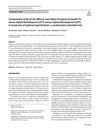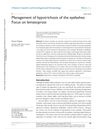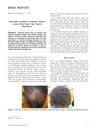April 2024 in “Cosmetics” Wigs help improve self-esteem and quality of life for people with hair loss from alopecia areata.
 September 2023 in “Pharmaceuticals”
September 2023 in “Pharmaceuticals” Tiny particles improved delivery of hair loss treatments to hair follicles, with lipid-based particles performing best.
The new minoxidil gel reduces runoff and improves eyebrow hair growth.
 1 citations,
July 2023 in “Archives of dermatological research”
1 citations,
July 2023 in “Archives of dermatological research” Bimatoprost 0.03% is as effective as minoxidil 2% for eyebrow growth.
 23 citations,
April 2010 in “Clinical, cosmetic and investigational dermatology”
23 citations,
April 2010 in “Clinical, cosmetic and investigational dermatology” Bimatoprost ophthalmic solution 0.03% safely and effectively increases eyelash growth when applied to the upper eyelid.
 14 citations,
July 2016 in “Pediatric Dermatology”
14 citations,
July 2016 in “Pediatric Dermatology” A 9-year-old girl with alopecia areata had successful hair regrowth using bimatoprost after other treatments failed.
 36 citations,
May 2011 in “Dermatologic therapy”
36 citations,
May 2011 in “Dermatologic therapy” No treatments fully cure or prevent alopecia areata; some help but have side effects or need more research.
 22 citations,
September 2004 in “Journal of The European Academy of Dermatology and Venereology”
22 citations,
September 2004 in “Journal of The European Academy of Dermatology and Venereology” Bimatoprost can cause longer, thicker, darker eyelashes and eyebrows.
 8 citations,
August 2020 in “PLOS Computational Biology”
8 citations,
August 2020 in “PLOS Computational Biology” A machine learning model called CATNIP can predict new uses for existing drugs, like using antidepressants for Parkinson's disease and a thyroid cancer drug for diabetes.
 4 citations,
January 2018 in “Forensic Science International”
4 citations,
January 2018 in “Forensic Science International” Researchers created a reliable method to detect hair-growth substances in products.
 January 2016 in “Springer eBooks”
January 2016 in “Springer eBooks” Alopecia Areata is an unpredictable autoimmune hair loss condition with limited and variable treatment effectiveness.
 59 citations,
July 2020 in “Journal of The American Academy of Dermatology”
59 citations,
July 2020 in “Journal of The American Academy of Dermatology” Oral minoxidil promotes hair growth but may cause side effects; needs monitoring.
 53 citations,
October 2012 in “The FASEB Journal”
53 citations,
October 2012 in “The FASEB Journal” Bimatoprost, a glaucoma medication, may also help treat hair loss.
 October 2024 in “International Journal of Pharmaceutical Sciences Review and Research”
October 2024 in “International Journal of Pharmaceutical Sciences Review and Research” A 5% minoxidil spray could effectively treat male baldness with fewer side effects and better patient comfort.
December 2022 in “Molecular Pharmaceutics” Latanoprost-loaded nanotransfersomes could help treat hair loss by promoting hair growth.
20 citations,
January 2003 in “Dermatology online journal” Prostaglandin analogs like Latanoprost might help grow hair on the scalp and body.
 29 citations,
January 2016 in “Annals of dermatology/Annals of Dermatology”
29 citations,
January 2016 in “Annals of dermatology/Annals of Dermatology” Arachidonic acid helps hair grow by increasing growth factors and improving follicle health.
 2 citations,
April 2021 in “International Journal of Pharmaceutics”
2 citations,
April 2021 in “International Journal of Pharmaceutics” Serum formulations were better at delivering molecules to the hair bulb than nanoparticles.
5 citations,
April 2022 in “Pharmaceutics” Minoxidil nanoparticles significantly boost hair growth in mice compared to regular minoxidil.
 December 2023 in “Journal of Cosmetic Dermatology”
December 2023 in “Journal of Cosmetic Dermatology” The hair growth product was effective and safe, increasing hair growth, thickness, and density while reducing hair fall.
 4 citations,
September 2014 in “Elsevier eBooks”
4 citations,
September 2014 in “Elsevier eBooks” Use some skin medications with caution during pregnancy; avoid strong steroids, certain eczema treatments, and systemic retinoids, but many topical treatments and nasal sprays are safe.
 1 citations,
September 2013 in “Elsevier eBooks”
1 citations,
September 2013 in “Elsevier eBooks” Hair ages and thins due to factors like inflammation and stress, and treatments like antioxidants and hormones might improve hair health.
 11 citations,
May 2009 in “Actas Dermo-Sifiliográficas”
11 citations,
May 2009 in “Actas Dermo-Sifiliográficas” Some treatments can help hair regrowth in alopecia areata, but none offer a cure, and effectiveness varies.
 1 citations,
January 2022 in “Faculty reviews”
1 citations,
January 2022 in “Faculty reviews” The best long-lasting results in treating hair loss may be achieved through combination therapy, including treatments like finasteride, minoxidil, and platelet-rich plasma injections.
 19 citations,
January 2012 in “Biomolecules & Therapeutics”
19 citations,
January 2012 in “Biomolecules & Therapeutics” Grateloupia elliptica extract may help prevent hair loss and promote hair growth.
 14 citations,
September 2018 in “International Journal of Molecular Sciences”
14 citations,
September 2018 in “International Journal of Molecular Sciences” Mackerel-derived fermented fish oil helps hair grow by activating growth pathways and increasing cell proliferation.
 20 citations,
March 2019 in “Journal of The European Academy of Dermatology and Venereology”
20 citations,
March 2019 in “Journal of The European Academy of Dermatology and Venereology” Minoxidil effectively and safely treats patchy hair loss, but more research needed.
 67 citations,
January 2013 in “Indian Journal of Dermatology, Venereology and Leprology”
67 citations,
January 2013 in “Indian Journal of Dermatology, Venereology and Leprology” The document concludes that alopecia areata is an autoimmune disease without a definitive cure, but treatments like corticosteroids are commonly used.
 5 citations,
March 2017 in “Journal of Dermatology”
5 citations,
March 2017 in “Journal of Dermatology” Patients and doctors find current hair loss treatments unsatisfying and believe involving patients in decisions improves results.
 4 citations,
May 2020 in “Dermatologic Therapy”
4 citations,
May 2020 in “Dermatologic Therapy” Redenyl lotion effectively promotes hair growth and improves quality of life for androgenetic alopecia patients.
























